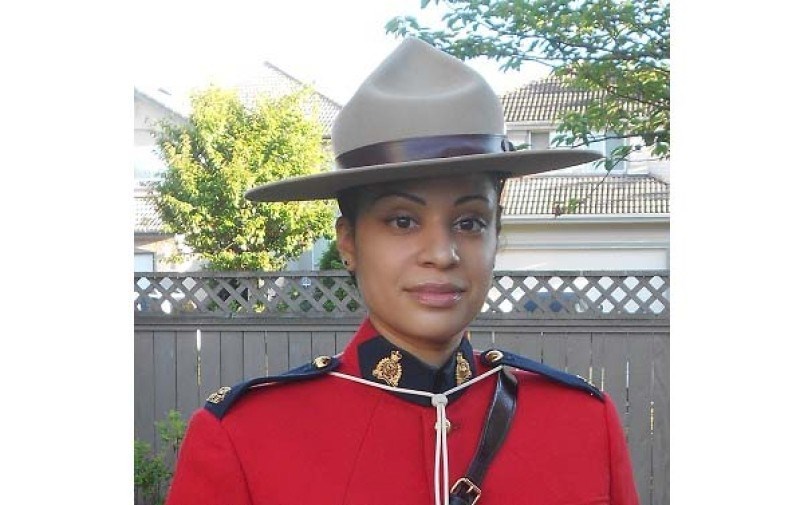An RCMP officer is speaking out about how she grew up in the Lower Mainland surrounded and cornered by racism on a daily basis.
Sgt. Veronica Fox, who is now based at the B.C. RCMP headquarters in Surrey, said growing up as a "Black kid" in this province "was not easy." She was born into a mixed-race family in the '80s in the Lower Mainland.
"I experienced isolation and racism on a daily basis. Elementary school was the worst," revealed Fox.
"My mother made countless trips to the principal's office to address the bullying; I was moved to different schools. Nothing worked."
Fox said there was the "everyday name calling" and disrespect "concerning my different appearance."
"But there were other, darker incidents. One day, the police were called when two boys decided to practice martial arts on me," she recalled.
"They were proud of their black and brown belts and they used the associated knowledge and skill to kick my legs black and blue.
"I just stood there and took the beating. The teacher I reported it to immediately after the incident ignored it. Later, the principal asked what I had done to instigate the attack, and questioned the origin of the injuries."
Fox is speaking out as police forces across the country, continent and the world come under fierce scrutiny in the wake of protests sparked by the death of George Floyd, a Black man, at the hands of a White police officer in the U.S.
She was one of many police officers in Canada who recently shared their personal experiences and perspectives on the issue of racism and discrimination.
On the subject, Fox recognized that, right now, people in North America are "feeling uncomfortable, angry and afraid."
"The death of George Floyd while in police custody has ignited civil unrest and protest across the United States and Canada. Some police are reacting in shock, feeling profiled and unfairly scrutinized because of a number of terrible incidents.
"Many in the public are wrestling for the first time with complex and polarizing issues such as systemic racism, free speech, public protest, and privilege.
"I have personally been deeply aggrieved to see what has been occurring south of the border. It's heart-breaking and appalling to witness the violence and unrest.
"As a police officer, I fear for the safety of my colleagues and identify with the countless members who are doing good work in a dangerous and difficult job every day on behalf of their communities.
"I also identify with the public who are angry and yearning for change. As sad as I am about recent events, I cannot say I am shocked."
Fox added that the "sense of discomfort, worry, and fear that people are feeling right now" is an "an old and familiar feeling for me."
"As a person of colour, and a minority in my community, I have felt this way my entire life," she said.
Harking back to the incident when she beaten up at school by the two boys, Fox said the female Mountie who investigated at that time "didn't have a lot of the procedural options we have today to properly address such issues.
"There were no real repercussions for the boys. My mother was asked to stop sending me to school in clothing that exposed my legs as the bruising was making other people feel uncomfortable; she declined this request."
Fox also remembered the first time she was called the N word-it was in Grade 3 or 4-and also the day she called enough and fought back.
"The word was delivered by a fellow classmate with such vitriol that I was shocked," said Fox.
"I didn't fight back when he spat in my face; I just took it. That one I didn't tell my parents about.
"And then there was the day I had enough. It was Grade 6. My class was wrapping up a sporting event on the school field and a female classmate called me that ugly word again.
"I decided to fight back and I called her the worst thing I could think of: 'freckle face.'
"Our teacher turned on me and reprimanded me in front of the entire class. He later admitted he'd heard the racial slur but had decreed that I should learn to keep silent and accept such abuse."
When Fox decided to become a police officer, she said, for the first time in her life, she came to truly understand what it means to hold power.
"I was suddenly granted the ability to take away someone's liberty and the responsibility to utilize appropriate force," said Fox.
"I took this very seriously; I never wanted to forget what it was like to be my former, externally powerless self.
"I have come to accept my past experiences at the hands of authority figures who chose to abandon their responsibilities invested in that authority.
"I believe these experiences have helped me become an empathetic cop."
She recognizes that police do, indeed, hold power, but "so, too do our lawyers, judges, teachers, and principals.
"The bottom line is that our current circumstances are not just a policing issue. They are an issue of our classrooms and halls of justice; they are an issue of the executive boardroom and the bank or grocery store around the corner from your home.
"We all carry a responsibility to contribute to the interests of community welfare. It begins with openness, acceptance, kindness, and dialogue."




